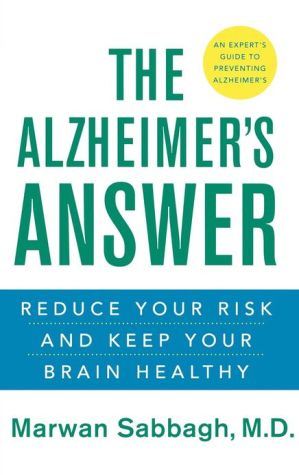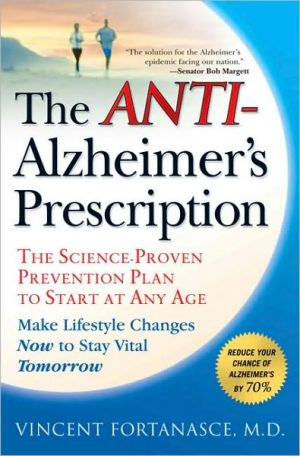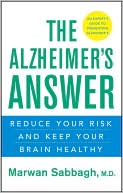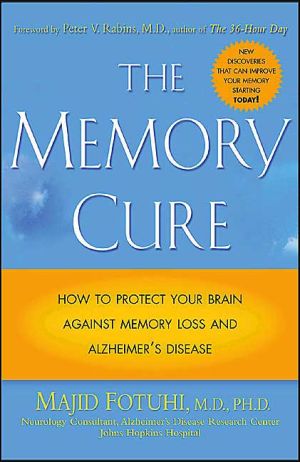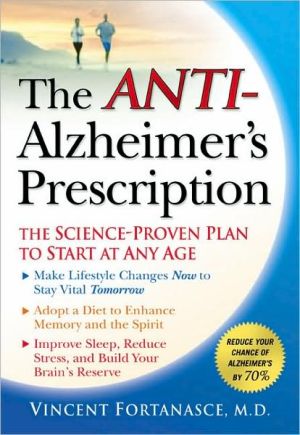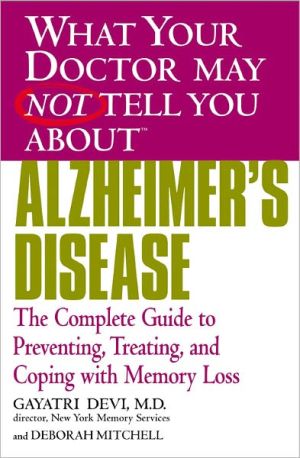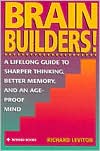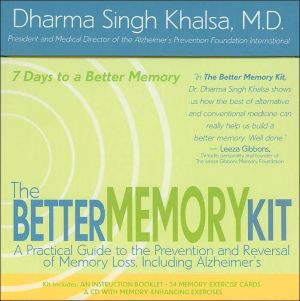Alzheimer's Answer
Praise for The Alzheimer's Answer\ "Dr. Sabbagh has written a book that points to a better public attitude toward Alzheimer's and a reasonable hope for transformation of the disease from a dreadful one-way street to a manageable, as well as treatable, chronic disorder that can allow continuing quality of life."\ —Hugh Downs\ "Dr. Sabbagh provides a concise, up-to-date, and clear understandingabout what we can do to prevent and delay the onset and progressionof Alzheimer's disease. The...
Search in google:
A front-line researcher offers cutting-edge advice on preventing and slowing the progress of Alzheimer's Drawing on the most up-to-date information available on the disease as well as experiences from his clinical practice, Dr. Marwan Sabbagh, a leading expert in Alzheimer's research, translates the current ideas driving Alzheimer's treatment into practical information you can use to determine your risk and develop a prevention strategy. You'll find tools for assessing your personal Alzheimer's risk and "What You Can Do" sections to help you keep your brain and body healthy, plus information on the treatment of Alzheimer's and its complications. Gives you the most up-to-date information on Alzheimer's and Alzheimer's prevention Written by a neurologist specializing in geriatric neurology and dementia who is one of the country's leading experts in Alzheimer's research Includes exciting revelations, such as finding that early onset Alzheimer's can be significantly slowed in its progress, giving the patient as many as ten to fifteen added years of quality life There are an estimated 5.2 million people living with Alzheimer's in America today. If you or someone you love is at risk of developing the disease or wishes to slow its advancement, this book will give you vital information to help you reduce risk and safeguard health and quality of life. Publishers Weekly This sobering review of the current research on and recommendations for Alzheimer's argues for identifying and combating risk factors decades before symptoms appear. Like other major conditions affected by obesity, high blood pressure and cholesterol levels, among others, Alzheimer's is growing at a rapidly increasing rate. Neurologist Sabbagh has been involved in many important Alzheimer's research trials and founded the Sun Health Research Institute's Cleo Roberts Center, a facility for studying age-related diseases, located in the geriatric community-dense Sun City area of Phoenix. He explains the mechanisms by which the brain undergoes devastating changes that manifest as Alzheimer's; the differences between age-related memory loss, Alzheimer's and other forms of dementia; and ways to assess genetic liabilities and risk factors from lifestyle choices. Although treatment goals and expectations for those with Alzheimer's are modest, Sabbagh says most risk factors can be offset well before retirement age through diet, physical and mental exercise, brain-specific supplements and, in some cases, medications that lower blood pressure and cholesterol levels, manage blood sugar and decrease inflammation. Sabbagh covers such concerns as exposure to toxic substances linked to neurological conditions and suggests many potent weapons to counteract development of brain plaque: omega-3 fatty acids, resveratrol, quercetin, folic acid, huperzine A, green tea and curcumin, among others. A guide to symptoms, diagnosis and treatment will prove helpful to patients and their families, while an overview of new drugs that could halt progression and possibly heal damaged brain cells offers hope for thefuture. (Feb.) Copyright 2007 Reed Business Information
Click to read or download
Foreword Justice Sandra Day O'Connor ixAcknowledgments xiIntroduction 1Preventing Alzheimer'sAlzheimer's Disease 9Alzheimer's and the Brain 35Is Preventing Alzheimer's Disease Really Possible? 45Real RisksYour Alzheimer's IQ: Know Your Risk 61Diabetes 81Body Weight and Obesity 88Stroke, Cerebrovascular Disease, and Heart Disease 98Cognitive Killers 107Blood Pressure and Hypertension 122Estrogen and Hormone Replacement Therapy 130Real RecommendationsEating Your Way out of Alzheimer's 139Red Wine and Other Alcoholic Beverages 156Managing Your Cholesterol and Lipids 164Exercising Your Way toward Prevention 175Staying Sharp with Mental Exercises 182Anti-inflammatories and Alzheimer's 191Vitamins May Protect 198Supplements: Real Hope or Empty Promises? 212If You Have Alzheimer's DiseaseGet Help: Alzheimer's Is Treatable 237The Future of Alzheimer's Disease 255References 267Index 299
\ From the Publisher* This sobering review of the current research on and recommendations for Alzheimer's argues for identifying and combating risk factors decades before symptoms appear. Like other major conditions affected by obesity, high blood pressure and cholesterol levels, among others, Alzheimer's is growing at a rapidly increasing rate. Neurologist Sabbagh has been involved in many important Alzheimer's research trials and founded the Sun Health Research Institute's Cleo Roberts Center, a facility for studying age-related diseases, located in the geriatric community–dense Sun City area of Phoenix. He explains the mechanisms by which the brain undergoes devastating changes that manifest as Alzheimer's; the differences between age-related memory loss, Alzheimer's and other forms of dementia; and ways to assess genetic liabilities and risk factors from lifestyle choices. Although treatment goals and expectations for those with Alzheimer's are modest, Sabbagh says most risk factors can be offset well before retirement age through diet, physical and mental exercise, brain-specific supplements and, in some cases, medications that lower blood pressure and cholesterol levels, manage blood sugar and decrease inflammation. Sabbagh covers such concerns as exposure to toxic substances linked to neurological conditions and suggests many potent weapons to counteract development of brain plaque: omega-3 fatty acids, resveratrol, quercetin, folic acid, huperzine A, green tea and curcumin, among others. A guide to symptoms, diagnosis and treatment will prove helpful to patients and their families, while an overview of new drugs that could halt progression and possibly heal damaged brain cells offers hope for the future. (Feb.) (Publishers Weekly, December 17, 2007)\ \
